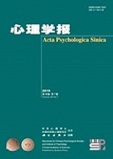|
|
ACADEMIC HELP--SEEKING: ITS RELATION TO SELFEFFICACY, VALUE, CLASSROOM CONTEXTAND ACADEMIC ACHIEVEMENT
Li Xiaodong(Department of Psychology, North--East Normal University, Changchun, 130024)Cheung Ping Chung(Department of Educational Psychology, the Chinese University of Hong Kong, Hong Kong)
1999, 31 (04):
435-443.
The present study investigated into the relationship between self--efficacy, value,classroom context academic achievement and academic help-seeking. One hundredand thirty--five eighth graders of a middle school responded to a questionnaire. Theresult showed that: (1) Self--efficacy was positively related to benefits of help-seekingand instrumental help--seeking, but negatively related to costs of help--seeking,executive help-seeking and avoidance of help--seeking. (2) Value was positively relatedto benefits of help--seeking and instrumental help--seeking, but negatively related tocosts of help--seeking, executive help--seeking and avoidance of help-seeking.(3) Aclassroom context which supported help--seeking was positively related to instrumentalhelp--seeking, but negatively related to threat from toachers and avoidance ofhelp-seeking; a classroom context which inhibited help--seeking was positively relatedto costs of help--Seeking, executive help--seeking and avoidance of help-seelking, butnegatively related to benefits of help--seeking and instrumental help--seeking. (4)Academic achievement was positively related to benefits of help-seeking andinstrumental help-seeking, but negatively related to costs of help--seeking, executivehelp--seeking and avoidance of help--seeking. (5) Self-efficacy, value, classroomcontext and academic achievement had important influence on help-seeking attitudes.(6) Attitudes, value, classroom context and academic achievement had importantinfluence on help--seeking behaviors.
Related Articles |
Metrics
|




